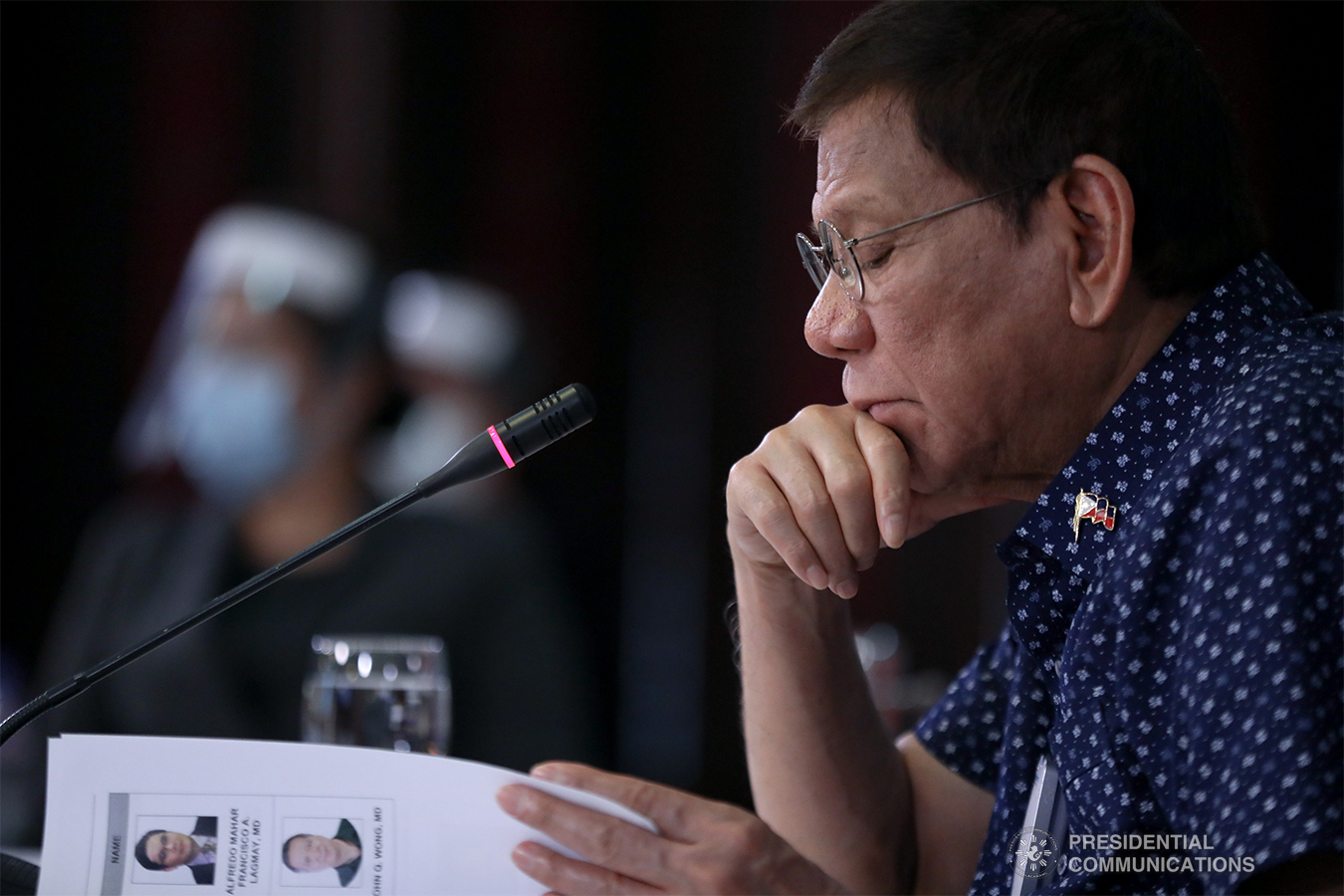Headline
Protests push PRRD to study anti-terror bill ‘even closer’

FILE: President Rodrigo Roa Duterte holds a meeting with members of the Inter-Agency Task Force on the Emerging Infectious Diseases (IATF-EID) at the Malago Clubhouse in Malacañang on April 20, 2020. ACE MORANDANTE/PRESIDENTIAL PHOTO
MANILA – Malacañang on Wednesday said calls to junk the enrolled anti-terror bill would push President Rodrigo R. Duterte to review the provisions of the measure “even closer”.
In an interview with ABS-CBN News Channel’s Headstart, Presidential Spokesperson Harry Roque explained that since the President certified the bill as urgent, he would “scrutinize” its provisions before deciding whether to sign or veto the measure.
Asked if there was a chance the President would allow the bill to lapse into law, Roque said, “The President did certify (it) as urgent so he agrees with the principal author of the bill, Senator Ping Lacson, that there is a need for the law.”
“Let’s just say that the public interest on the bill will make the President review the provisions of the bill even closer,” he added.
Roque confirmed that a copy of the bill was transmitted to Malacañang on Tuesday and that the legal department of the Office of the Executive Secretary has started reviewing its provisions.
He also emphasized the role of the Department of Justice (DOJ), which was tasked by the Palace to review the provisions of the bill amid allegations by some groups that it contained unconstitutional provisions.
“The DOJ is still the legal adviser of the President even if he has his own Legal Office within Malacañang itself,” Roque said.
Terrorism still exists
Amid questions on the President’s move to certify the bill as urgent amid the coronavirus disease (Covid-19) pandemic, he pointed out that “terrorists did not stop their nefarious activities” amid the prevailing health crisis.
Roque cited the recent attacks launched by alleged members of the Bangsamoro Islamic Freedom Fighters (BIFF) in Maguindanao and the Abu Sayyaf Group in Patikul, Sulu, and various instances where communist rebels attacked soldiers assisting aid distribution.
“It’s very clear that terrorists did not really cease their activities despite the Covid-19 situation and that is why it was certified urgent,” he said.
Roque said Duterte’s certification was also to ensure that the House of Representatives would “act on” the measure that failed to pass during the 17th Congress.
“I guess the certification ensured that it will pass in the House. But you and I know that with or without certification, I think any legislative initiative supported by the administration would find better chances of being passed in the House than in the Senate,” he said.
Roque, however, clarified that the measure was not “rushed” solely because of the President’s certification.
“It’s just a matter of course. Let me emphasize here that the bill was not rushed solely because of the certification. This bill was pending since January of 2018. It’s been approved four months ago in the Senate and of course, it was already discussed, finished at the committee level at the House of Representatives but the approval on second and third reading of the House came after the certification,” he said.
Constitutionality
Recognizing that he once challenged the constitutionality of the Human Security Act (HSA) of 2007, the law which the anti-terror bill seeks to amend, Roque pointed out that since he and his fellow petitioners “failed” to succeed, it was no use to continue questioning its constitutionality.
“We actually went to court and attempted to question the constitutionality of HSA and failed.
The courts have said it’s constitutional, then why would you continue questioning its constitutionality?” he said.
In 2007, Roque challenged the constitutionality of the HSA but he and his fellow petitioners eventually lost at the Supreme Court in 2013.
Under the anti-terrorism bill, persons who shall threaten to commit terrorism, and those who will propose any terroristic acts or incite others to commit terrorism shall suffer imprisonment of 12 years.
Suspected persons can be detained for 14 days without a warrant of arrest with an allowable 10-day extension.
A 60-day surveillance on suspected terrorists can also be conducted by the police or the military, with an allowable 30-day extension.
The opposition and progressive groups have strongly opposed the passage of the measure in Congress over concerns that it would further erode human rights in the country.





















